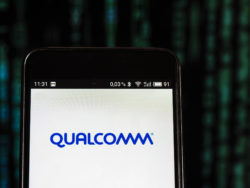Top Class Actions’s website and social media posts use affiliate links. If you make a purchase using such links, we may receive a commission, but it will not result in any additional charges to you. Please review our Affiliate Link Disclosure for more information.

The next phase of the Qualcomm class action lawsuit will now begin since the presiding California federal judge has certified the Class Members. Class Members started the Qualcomm class action lawsuit based on allegations that they paid overage charges because of the licensing practices used by the company.
Reports say that it is expected that there are hundreds of millions of cellphone buyers who could be considered Class Members.
The Class Members approved for certification in the Qualcomm class action lawsuit include any entity or person in the U.S. that purchased a phone containing the modem chipset made by Qualcomm from February 2011 forward.
The filers in the Qualcomm class action lawsuit argue that the company has leveraged their major role in the production of these modem chipsets required for most modern smartphones to push up the company’s licensing payments received from the manufacturers of phones.
These costs were linked to essential standard patents, but those higher costs were passed along to consumers.
The estimate for potential damages in the Qualcomm class action lawsuit could go as high as $5.54 billion for the potential 250 million Class Members.
The judge in the class action lawsuit against Qualcomm said that, despite the broad nature of the prospective Class Members, the plaintiffs had indicated enough proof of the alleged scheme to win class certification.
In January 2017, the Federal Trade Commission issued an enforcement action against Qualcomm, claiming that the company used a purposeful scheme to garner high royalties for baseband processors. The agency asserted that the company has used their role as the primary provider of this technology to push prices up.
Those allegations led to the Qualcomm class action lawsuit brought forward by consumers who say they were the ones who paid the price with higher costs.
Additionally, the lawsuit and the FTC argue that Qualcomm had an Apple exclusivity deal to supply chips in all iPads and iPhones from October 2011 through September 2016. Apple is involved in its own litigation with Qualcomm since Apple is now using Intel chips in their products as well.
The plaintiffs in this class action pushed to be certified in the summer of 2018 based on their claims that the costs were similar to an industry-wide tax. Qualcomm responded with an argument that such a bid was unfeasible.
The judge in that Qualcomm class action lawsuit said, however, that class certification was approved and disagreed with the defendant’s argument that litigation couldn’t be managed due to the number of prospective Class Members.
The consumers are represented by Kalpana Srinivasan, Marc M. Seltzer, Steven G. Sklaver, Amanda K. Bonn, Oleg Elkhunovich, Krysta Kauble Pachman and Joseph Grinstein of Susman Godfrey LLP, Joseph W. Cotchett, Adam J. Zapala, Brian Danitz, Mark F. Ram and Michael A. Montano of Cotchett Pitre & McCarthy LLP, and Steve W. Berman, Jeffrey D. Friedman and Rio S. Pierce of Hagens Berman Sobol Shapiro LLP.
The Qualcomm Class Action Lawsuit is In re: Qualcomm Patent Licensing Antitrust Litigation, Case No. 5:17-md-02773, filed in the U.S. District Court for the Northern District of California.
UPDATE: On Oct. 12, 2018, Qualcomm says that they should be able to appeal a California court’s decision to certify a proposed Class of 250 million individuals in a lawsuit alleging the company gouged consumers by hiking the price of a chip used in most cell phones.
UPDATE 2: On Jan. 23, 2019, consumers who purchased a cell phone since Feb. 11, 2011, may be affected by a Qualcomm antitrust class action lawsuit pending in federal court. A settlement has not been reached and no money is available at this time. However, this litigation is being dubbed “quite likely the biggest class action in history,” and may affect the rights of more than 250 million cell phone owners. Learn more here.
UPDATE 3: On Jan. 23, 2019, Qualcomm was granted an immediate appeal of a massive certified Class of cellphone owners involved in a class action lawsuit alleging the company overpriced chips ubiquitous in mobile devices. Qualcomm contends that the newly certified Class of about 250 million consumers is “simply too large and unwieldy to manage” in a petition to appeal the decision brought to the Ninth Circuit two-judge panel.
ATTORNEY ADVERTISING
Top Class Actions is a Proud Member of the American Bar Association
LEGAL INFORMATION IS NOT LEGAL ADVICE
Top Class Actions Legal Statement
©2008 – 2024 Top Class Actions® LLC
Various Trademarks held by their respective owners
This website is not intended for viewing or usage by European Union citizens.















5 thoughts onQualcomm Class Action Lawsuit Gets Certification
Add me
please add me
Add me
Add me please
add me